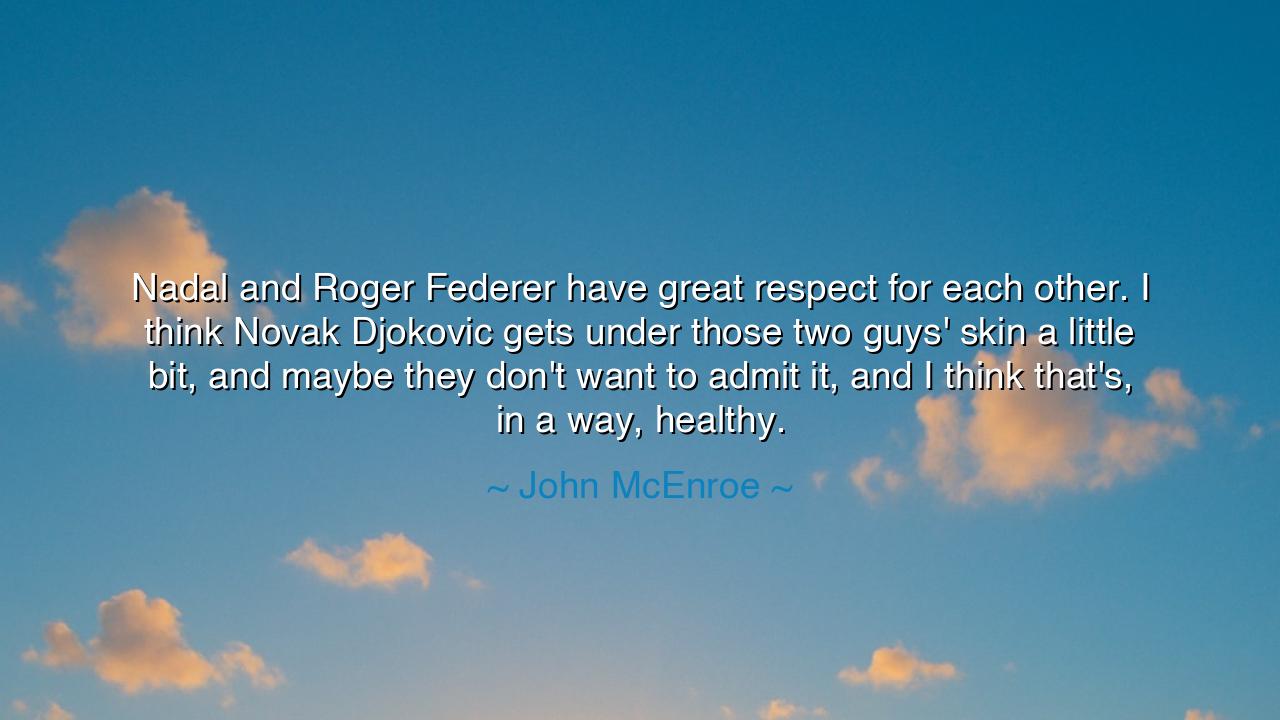
Nadal and Roger Federer have great respect for each other. I
Nadal and Roger Federer have great respect for each other. I think Novak Djokovic gets under those two guys' skin a little bit, and maybe they don't want to admit it, and I think that's, in a way, healthy.






When John McEnroe declared, “Nadal and Roger Federer have great respect for each other. I think Novak Djokovic gets under those two guys' skin a little bit, and maybe they don't want to admit it, and I think that's, in a way, healthy,” he was not merely commenting on tennis; he was unveiling the eternal truth of rivalry, respect, and the fire that competition brings to greatness. His words shine with the wisdom of one who has fought his own battles on the court, who knows that the measure of a champion lies not only in their victories, but also in the presence of those who challenge them most deeply.
The mention of Nadal and Federer calls to mind two warriors bound not by blood, but by mutual honor. Their duels on grass, clay, and hard courts are sung like the epics of old, and their reverence for one another has become a model of sportsmanship. They embody what the ancients would call agon, the noble contest, where rivals sharpen each other as iron sharpens iron. In their respect lies a purity: the recognition that the other’s greatness magnifies one’s own.
Yet into this hallowed space steps Novak Djokovic, whose presence unsettles the balance. McEnroe observes that Djokovic “gets under their skin,” a phrase that speaks to the subtle sting of rivalry that goes beyond admiration into discomfort. This, too, is part of the eternal dance of champions. For where there is only comfort, greatness stagnates. It is the rival who unsettles, who disturbs, who forces one to confront weakness, that drives a warrior to greater heights. In this way, McEnroe calls it healthy, for it is through tension that true mastery is forged.
History offers us parallels. Recall the story of Alexander the Great, who, though mighty, measured himself always against the shadow of Achilles. It was not enough for him to conquer; he sought to surpass the heroes of legend, and in that pursuit, he stretched beyond mortal ambition. Or consider the tale of Mozart and Salieri, where rivalry—whether of admiration or envy—became the crucible for artistic brilliance. So it is in tennis: the existence of Djokovic unsettles Nadal and Federer, but in that unsettling, they find new fire.
The deeper meaning of McEnroe’s words is this: respect and rivalry are not enemies, but companions. Federer and Nadal embody respect; Djokovic embodies rivalry’s sting. Together, they form the trinity of forces that push human beings beyond their limits. Respect alone breeds comfort; rivalry alone breeds bitterness. But when both are present, when admiration meets irritation, greatness ascends to its highest peak.
For us, the lesson is profound. In our own lives, we will meet those we respect and those who unsettle us. Do not despise the one who gets under your skin; for often, that is the person who will drive you to grow. Welcome them, even as they provoke you, for their presence sharpens your spirit. Just as Federer, Nadal, and Djokovic push each other to new heights, so too can our rivals—whether in work, study, or life—become our greatest teachers.
Practical wisdom follows: seek both respect and rivalry. Surround yourself with those who honor you, for they will remind you of dignity. But also welcome those who challenge you, even uncomfortably, for they will remind you of your untapped potential. Balance these two forces, and you will rise higher than if you walked alone.
Thus McEnroe’s words, spoken of tennis, resound as an ancient teaching: respect is the root, rivalry is the fire, and together they forge greatness. Let us carry this truth into our own battles, so that when our time comes, we too may stand as champions—not only of victory, but of character, sharpened by both friends and rivals alike.






AAdministratorAdministrator
Welcome, honored guests. Please leave a comment, we will respond soon